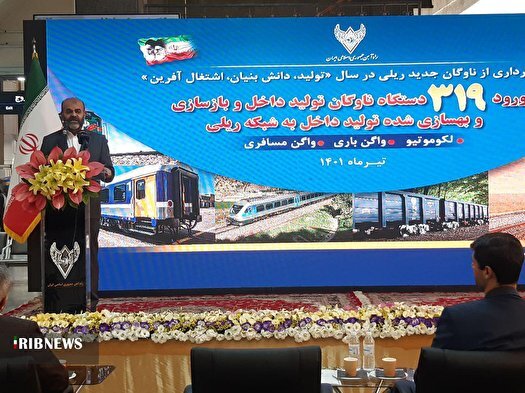Railway fleet receives 319 domestically-made wagons, locomotives

TEHRAN- Iranian railway fleet received 319 domestically-made wagons and locomotives worth 94.6 trillion rials (about $34 million) in a ceremony on Monday.
The ceremony was attended by Transport and Urban Development Minister Rostam Qasemi, IRNA reported.
Some 305 new freight wagons, six newly-made locomotives, seven renovated passenger wagons, and a renovated locomotive joined the railway fleet in the said ceremony.
The mentioned wagons and locomotive have been manufactured and renovated by domestic companies namely Novin Sanat Raja, Wagon Kowsar Company, Wagon Pars Company, Green Plour Industrial Group, and Iranian Rail Industries Development Company, as well as Mapna.
Speaking at the unveiling ceremony, Qasemi referred to the capabilities of domestic manufacturers to build wagons, rail infrastructure, and even locomotives, saying that there is a need for developing the country’s railway network and consequently the railway fleet since the country is facing an increasing demand for domestic freight rail transportation.
According to the minister, in addition to the domestic demand for rail transportation, the country’s neighbors are also calling for new corridors to transit their goods through Iran.
“Recently, we have signed a contract with Russia to transport 10 million tons of cargos to the Persian Gulf nations. Turkmens are also looking for a cargo transportation contract through Iran's transit channel. Turkey has also made such a request and a delegation from the country is going to visit Iran in the next few days,” he said.
The development of the railway sector is one of the macro policies of the Iranian government as it has been emphasized by the general policies of the country’s National Development Plan.
In this regard, the national railway fleet has been constantly receiving new domestically-made locomotives and wagons over the past two years under the framework of a program implemented by the Transport Ministry in collaboration with the country’s private sector.
Advantages such as consuming less fuel and creating less pollution as well as high safety attach priority to the railway when compared to some other transportation systems, and makes its development economically viable.
When it comes to railway development, the renovation of existing infrastructures comes also under the spotlight, since according to RAI, currently, the average age of the country’s passenger and freight wagons stands at 24 years and there are also rail tracks that have been built over 50 years ago.
EF/
Leave a Comment